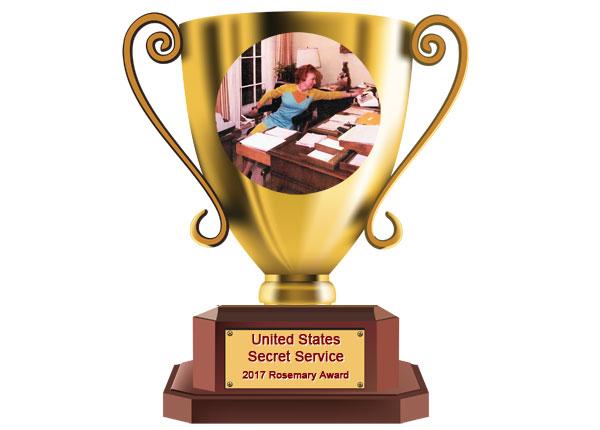Washington, D.C., March 12, 2018 - The Secret Service and the White House have emerged as the dubious winners from the hard-fought competition for the National Security Archive’s infamous Rosemary Award for worst open government performance of 2017.
The award, which the Archive began bestowing in 2005, is named after President Nixon's secretary, Rose Mary Woods, who testified she had inadvertently erased 18 and ½ minutes of a crucial Watergate tape when she stretched to answer the phone with her foot still on the transcription pedal. Previous Rosemary Award “winners” include the CIA, the Treasury Department, the Air Force, the FBI, the Justice Department (twice), and Director of National Intelligence James Clapper.
The Secret Service clinched the 2017 award for its claim that “There is no system for keeping track of Presidential visitors at Mar-a-Lago.” This remarkable assertion was made in an October 4, 2017, court filing during the course of the National Security Archive’s Freedom of Information Act (FOIA) lawsuit seeking the Secret Service's White House visitor logs, along with Secret Service records of presidential visitors at other Trump properties.
The shocking claim that there is no system for tracking who has access to the President when he is at Mar-a-Lago (or any other Trump property) means that anyone, from lobbyists to foreign agents, can have direct access to the president for the price of a Mar-a-Lago membership paid to the president himself.
The October 4th filing came on the heels of the White House website promising, then reneging, that “it will post records on White House visitors on an ongoing basis,” the Secret Service losing the Archive’s initial FOIA request, and then its request for a one-week extension during the course of our lawsuit. The Secret Service said it needed more time to process the “substantial” quantity of documents responsive to our request “numbering in the hundreds” – only to release merely two pages of responsive records concerning the visit of Japanese Prime Minister Shinzo Abe. This drastic turn-around suggests the Secret Service’s response was influenced by the White House.
Kate Doyle, Archive senior analyst, filed the initial FOIA for the White House visitor logs on the Monday after Trump’s inauguration. The FOIA lawsuit, Doyle et al. v. DHS, was filed on April 10, 2017, in the federal District Court for the Southern District of New York and was brought by the Archive together with the Knight First Amendment Institute at Columbia University and Citizens for Responsibility and Ethics in Washington (CREW). Jameel Jaffer, Alex Abdo, and Anne Weismann argued the case.
This year’s Rosemary Award brought fierce competition from a plethora of U.S. government actors who worked to make America more secret and its citizens more uninformed. Runners up for this un-coveted award include:
- The United States Congress for racing to pass a “license to bribe” bill, which was among the first that Donald Trump signed as president. The bill repealed an Obama-era rule that forced companies to disclose any payments made to foreign governments to extract oil, gas, and minerals.
- The National Park Service for blaming the disabled for the scrubbing of 92 documents from its website describing the climate action plans of National Parks. After environmental and information advocates called out the National Park Service for this erasure, it claimed that the deletion was due to its efforts to comply with the Rehabilitation Act, a claim that does not hold water.
- The Department of Justice (for the third time) for seemingly spiking its “release to one release to all” proactive disclosure initiative begun during the Obama administration and then refusing to say publicly whether or not it had.
- Environmental Protection Administrator Scott Pruitt for taking a break from flying first class to be personally involved in the deletion of information about climate change from the EPA’s website. Pruitt’s staff was also involved in hijacking searches on the EPA’s website to point users to pages touting Trump’s executive order on energy independence when they had actually searched for the Obama-era Clean Power Plan.
- The CIA for arguing to U.S. District Judge Ketanji Brown Jackson that it needed four criteria (“To,” “From,” time frame, and subject) to search for e-mails when it knew that it actually didn’t. Fortunately, Brown Jackson ruled against this disingenuous argument by the Agency. This huge win for Muckrock, represented by Kel McClanahan of National Security Counselors, benefits all requesters asking for CIA (or other agency) e-mails. Unsurprisingly, the CIA, which brags of “technology so advanced, it’s classified,” still refuses to accept FOIA requests by e-mail.
- The Federal Communications Commission for claiming “jokes” its staffers wrote about Chairman Ajit Pai colluding with Verizon could be withheld under FOIA Exemption 5 because they could “harm” the agency. Fortunately for those wishing to see the “jokes” (actually, unfortunately – because the jokes are so terrible) a video of Pai himself telling these “jokes” was recorded at a lobbyist dinner and leaked. Though they are terrible, it’s clear the jokes should never have been withheld under Exemption 5, as the only thing they could conceivably “harm” is the audience.
- Finally, we considered giving the Rosemary to Donald Trump and his 5.6 lies per day as president (according to the Washington Post fact checking team led by Glenn Kessler), since his thousands of mistruths are, by definition, an attack on government information. But in the end, we decided that just would not have been fair to our award’s namesake, Rose Mary Woods. Her act of destruction in the White House lasted only 18 and ½ minutes.

